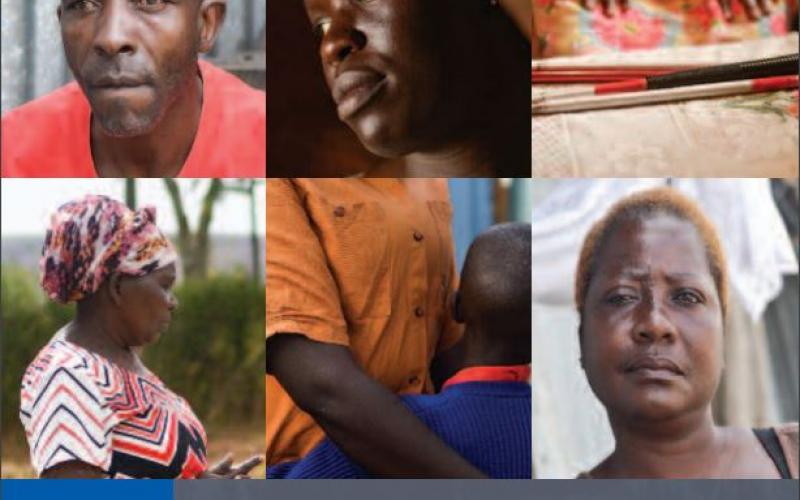Date: Sun, 3 Apr 2016 12:28:53 +0200

While the government provided limited compensation to some of the people who were displaced or lost property in 2009 and in 2011-12, survivors of rape and other sexual violence have been excluded as a group from compensation unless they also lost property or were displaced.
A year ago, the Kenyan government finally announced a fund to help survivors of the widespread violence in 2007 and 2008 tied to the disputed presidential election.
It was the first sign of hope for the hundreds of women who were brutally raped during that conflict and are still suffering the consequences. But a year has passed, and the government has neither provided any specifics about how the money will be used nor whether the rape victims will be included.
When President Uhuru Kenyatta announced the approximately $96 million fund last March he said it would provide "restorative justice" for victims.
In recent months, I interviewed 163 women who were raped – many of them brutally gang raped – during the three-month period after the election, when supporters of the two main political parties fought, often along ethnic lines, killing 1,133 people and displacing over 600,000.
Apiyo was a 53-year-old mother of five when she was raped and beaten by four men in January 2008. Eight years later, the attack still torments her. She cannot sleep and she thinks about the rape all the time. Once the owner of a clothing business in Nakuru, she lost her husband and her business in the violence and now lives in poverty, dependent on the goodwill of her in-laws.
A conflict over who orchestrated the violence and whether anyone will be held accountable is still playing out across Kenya and beyond. But the stories of the hundreds of women and girls victimized during that violence and their struggles ever since have not yet been told.
CRUCIAL OPPORTUNITY
Kenya's initiative to provide reparations could be a crucial opportunity for rape and sexual violence victims, if they and their needs are properly recognized and reparations are made in line with international good standards and practice.
So far they have been left out.
While the government provided limited compensation to some of the people who were displaced or lost property in 2009 and in 2011-12, survivors of rape and other sexual violence have been excluded as a group from compensation unless they also lost property or were displaced.
Few of the women I interviewed had been able to get post-rape care at the time, and almost none could afford to pay for much needed health care then or ever since.
I believe many hundreds of women were raped during that time – far more than the 900 an official commission of inquiry estimated– and I know now that many more are still suffering.
The rapes were exceptionally brutal. Women were tied up, their legs pulled apart. They were thrown onto hard surfaces, beaten with heavy objects and kicked and cut with machetes. Some had sticks and bottles inserted into them. Some women said they passed out during the assault.
Some women lost everything, and now cannot work or go to the market because of pain and sickness from the rape. They told me they are too traumatized to sleep at night and think every day about killing themselves. Their husbands beat them and blame them for the rapes or have chased them away. And some struggle daily to raise children born from the rapes.
Officials have closed their eyes to these women's poverty, illnesses and social exclusion.
MESSAGE OF INDIFFERENCE
The failure to conduct proper investigations and prosecute the attackers and to ensure that women have access to the services they need to heal sends a harsh message to women that sexual violence is not taken seriously.
We have seen much progress internationally on conflict-related sexual violence over the past decade. The U.N. Security Council adopted several landmark resolutions on sexual violence and regularly calls on all armed parties to conflict to cease acts of sexual violence. Humanitarian agencies and groups work hard to provide post-rape care to survivors.
But in Kenya, and other countries where sexual violence in conflict has been a problem, the governments have largely ignored the victims. This deepens suffering and problems the governments could have mitigated.
On March 8, International Women's Day, Kenya also drafted a national action plan based on the U.N. Security Council Resolution 1325, which was passed in 2000 and recognizes women as active participants in conflict resolution and guarantees their protection in peace agreements.
It should be used to drive forward the reparations process, including by strengthening availability of medical and psychosocial services. It could lead to arrests and prosecution for past and ongoing sexual violence, and strengthen the participation of women in planning to address peace and security issues, as the country continues to grapple with various security challenges.
It will take years and much courage from survivors and Kenya's brave women's rights activists to solve these problems. But the government can and should take steps now to finally help women with urgent needs that stem from events almost a decade ago.
One woman I interviewed was in her 80s. She was raped by two young men, who threw her on the ground, where she hit a stone. One of them stepped on her chest. In the middle of the interview she suddenly fell quiet. I asked her if she needed a break or wanted to stop the interview.
But she responded: "I am just surprised that you are here, listening to me. All these years I believed that we had been forgotten and nobody was really interested in people like me. But here you are."
* Agnes Odhiambo is a senior women's rights researcher at Human Rights Watch and author of a new report, "I Just Sit and Wait to Die: Reparations for Survivors of Kenya's 2007-8 Post Election Sexual Violence." This article was previously published in [url=http://womensenews.org/2016/03/in-kenya-forgotten-rape-survivors-have-stories-to-tell/]Womensenews[/url]